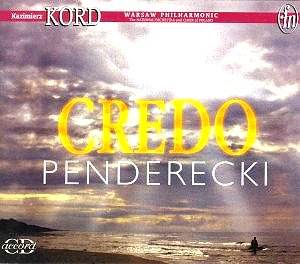This
Mass provides further evidence that
Penderecki has softened his musical
language over the years.
He
has much experience in major works for
soli, chorus and orchestra and particularly
those with a religious subject. We can
trace this trend across the decades:
Psalms of David (1958), Stabat
Mater (1962), St Luke Passion
(1965), Utrenja (1971), Canticum
Canticorum (1973), Magnificat
(1974), Polish Requiem (1980-84)
and The Seven Gates of Jerusalem
(1996).
I
had been braced, in preparing this review,
for the racking experimental effects
of the 1960s and 1970s. It is obviously
time I got out a bit more and heard
the works from the intervening years.
Penderecki in the Credo is not
quite as populist as Kilar
but he is not 'difficult'. Bach is an
influence but this is no neo-archaic
museum piece. The joyous shadowing of
the solo trumpet in the Qui Propter
instantly holds the attention. The
sound of Orthodox chant is another influential
'voice' especially in the first two-thirds
of the piece. The extraordinary subdued
dialogue of glowing brass instruments
at the start of the Crucifixus is
a highlight but that movement stands
out in its tender consolatory balm-infused
writing anyway; wonderful singing from
the soprano (not sure which one) and
boys choir. The staccato violence and
macabre grit of Crucem Tuam provides
contrast amid all the devotion and prayer.
This continues somewhat into the Et
in spiritum but is dispelled by
an evocation of 'triumph in the skies'.
The machine-rhythm of tom-toms and jazzy
percussion clangour give place in the
Confiteor to opera-dramatics.
This is a big set piece - extremely
inventive with the rhythmic material
rather jazzy and the brass 'choir's
tone being as black as coal. The piece
ends (tr.9 Et Vitam), I think,
rather enigmatically, on a questioning
note for the four trumpets exiting on
a long-held sphinx-like note rather
than in blinding choral affirmation.
The
work is in nine sections which are often
very short; the longest (Et Resurrexit)
at 8.00 and the shortest at 4.00 (Et
In Spiritum Sanctum).
The
sung Latin is given in full in the booklet
with parallel English translation -
no Polish translation. The words are
from the mass but with large infusions
from the Pange Lingua, Polish liturgical
hymnal, Psalms 117 and 129 and The Apocalypse.
The
work was commissioned jointly by the
Bach-Akademie Stuttgart and the Oregon
Bach Festival. It was written between
1996 and 1998 and is dedicated to the
famous conductor Helmuth Rilling who
directed the world premiere of the Credo
in Oregon.
The
luxury presentation including card sleeve
and extensive English language notes
indicate a disc intended to help the
work travel - which it deserves to do.
I hope that it will be a frequent fixture
in concert halls and churches across
the world.
Rob
Barnett
The
entire CDAccord catalogue is available
from MusicWeb

![]() for
details
for
details